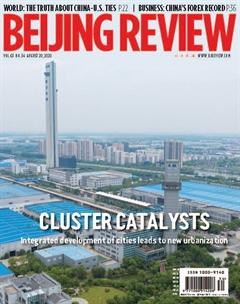BUMPER CELEBRATION

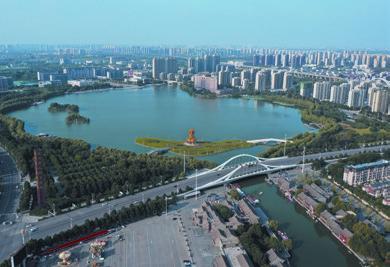
Green Development
An aerial photo of Huifeng Lake in Tangshan, a city in Hebei Province in north China, on August 9.
Decision on HKSAR LegCo
Lawmakers v oted on August 11 to adopt a decision for the Sixth Legislative Council (LegCo) of Hong Kong Special Administrative Region(HKSAR) to continue performing its duties.
The decision was passed at the 21st Session of the Standing Committee of the 13th National Peoples Congress, Chinas top legislature.
After September 30, the Sixth LegCo will continue for no less than a year until the term of the Seventh LegCo starts. The term of the Seventh LegCo will still be four years when it is formed in accordance with the law, according to the decision.
Lawmakers agreed that as the local legislature of HKSAR and an important component of HKSARs political structure, the LegCo exercises important powers and functions, including enacting, amending and repealing laws, examining and approving budgets, and approving taxation and public expenditure.
The HKSAR Chief Executive in Council decided to postpone the election of the Seventh LegCo, originally scheduled for September 6, for one year, in response to the severe epidemic situation of the novel coronavirus disease (COVID-19) in Hong Kong.
In order to uphold the constitutional and law-based order in HKSAR, and ensure the normal governance by the HKSAR Government, it is necessary and appropriate for the NPC Standing Committee to make the decision on the Sixth LegCos continued performance of duties and on other related matters, lawmakers said. The decision is in line with the provisions and principles of the Constitution and the HKSAR Basic Law, they added.
Air Travel
Chinas air travel demand has recovered signifi cantly since June with a continuous increase in the volume of fl ights, according to the Civil Aviation Administration of China(CAAC).
In June, the civil aviation industry handled an average of 10,820 fl ights daily, up 14.1 percent from that in May, statistics from CAAC showed.
In July, the industry handled 370,000 fl ights, or an average of 11,941 fl ights daily. More than 36.99 million air passenger trips were made in July, a rise of 20.35 percent from June.
CAAC called for measures for regular epidemic prevention and control amid the current complicated and severe conditions to prevent imported cases through the civil aviation sector.
The civil aviation regulator in early June adjusted policies for international passenger fl ights, allowing more foreign carriers to resume fl ights to China on a once-a-week basis starting from June 8.
Coupon Stimulus
Beijing started to offer 2.8 million coupons from August 8 in the latest move to spur consumption that is recovering from the COVID-19 blow, according to the Beijing Municipal Commerce Bureau.
The coupons are available on the app of e-commerce giant JD.com. Two million coupons can be used at participating restaurants and retailers in Beijing, and 800,000 coupons can buy products equipped with smart technologies.
Compared with previous coupons issued by authorities in Beijing, the new ones will offer higher discounts, and can be used at more retailers such as franchise stores.
Healthy Learning
The authorities have started a two-month campaign to address prominent problems in online education platforms for minors and protect students lawful rights and interests, the Cyberspace Administration of China (CAC) said on August 7.
Jointly launched by the administration and the Ministry of Education, the campaign aims to rectify problems regarding online games, dating sites, and pornographic, violent and fraudulent information advertised on learning platforms.
Since the majority of students have turned to online courses during the epidemic, such content is likely to have a negative impact on society and students physical and mental health.
Under the campaign, all platforms setting up online classes for minors are asked to assume the main responsibility of content management, strictly examine the courses, and ban pop-up advertisements and information unsuitable for minors.
The administration said it will crack down on illegal platforms and institutions involved in such issues, and create a healthy learning environment for minors.
Relocation Complete
China has basically completed relocation programs for poverty alleviation by the end of July, the State Council Leading Group Offi ce of Poverty Alleviation and Development said on August 7.
Despite the adverse impact caused by COVID-19, China pushed ahead with efforts to fi ght poverty in the fi rst half of the year, an offi cial with the offi ce said.
Headway has been made in employment for poor laborers, while the campaign of poverty relief through consumption is progressing well.
A total of 2.85 million people in 52 key poverty-stricken counties have returned to work, and 22 provincial-level regions in central and west China have provided around 4.79 million poor people with public welfare jobs.
Some 428,400 poverty relief projects in these regions have started operating, and 30,443 poverty relief workshops have resumed.
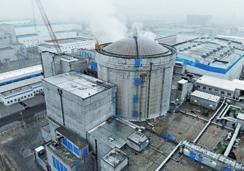
New Power Generator
Unit 5 at the Tianwan Nuclear Power Plant in Lianyungang in Jiangsu Province, east China, on August 9. The unit, built by China National Nuclear Corp., was connected to the grid for the fi rst time on August 8, laying the foundation for its commercial operation.
Research Ethics
The Ministry of Science and Technology and the National Natural Science Foundation have issued a notice calling for the enhancement of professional integrity management among researchers.
The notice says research institutions, colleges and universities, enterprises and social organizations should enhance management to help research fellows raise their awareness of academic ethics and integrity.
The notice asks units whose research projects are supported by public funds to honestly report their work in integrity management, as well as investigations into and the handling of problems, to administrative departments at the provincial level or higher.
The notice also calls for enhancement of the quality of research papers.
Flood Response
On August 7, the fl ood-control response was lowered from Level III to Level IV, the lowest in the fourtier emergency response system for fl oods.
The downgrading came as water levels in the Yangtze River, Huaihe River and Taihu Lake continued to fall, the Ministry of Emergency Management said.
The ministry urged localities to keep a close eye on the situation and strengthen prevention of possible disasters.
All-out efforts should be made to help affected residents and coordinate reconstruction, an offi cial with the ministry said.
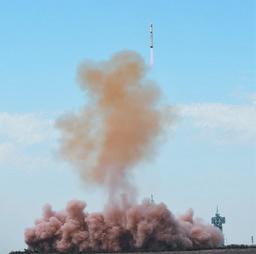
Successful Launch
A new optical remote-sensing satellite is launched from the Jiuquan Satellite Launch Center in northwest China on August 6. The satellite, Gaofen 9-04, was sent into orbit by a Long March-2D carrier rocket. The satellite will be mainly used for land surveys, city planning, road network design, crop yield estimation and disaster prevention and mitigation.
Facilitating Jobs
The government is taking multiple measures to help migrant workers fi nd jobs as regular novel coronavirus disease (COVID-19) prevention and control is coordinated with efforts for economic and social development.
According to a recent guideline issued by 15 government departments, including the Ministry of Human Resources and Social Security and the National Development and Reform Commission (NDRC), the channels through which migrant workers can seek employment will be broadened, a move that is related to“winning the battle against poverty.”
More policy support will be given to industries such as accommodation and catering, which are labor-intensive and major employers of migrant workers. Flexible employment will be promoted in new occupations such as livestreaming and delivering online orders.
Aside from seeking jobs in cities, rural migrant workers are also encouraged to make the best of opportunities in their local areas, for example, processing agricultural and forestry products, as well as rural-leisure tourism. Those who want to set up their own businesses will receive guidance from the government.
Rural migrant workers who have lost their jobs will be able to register their status and access vocational training as well as subsidies during the training.
New Scenic Spot
Outlet stores in Shanghai have become one of the retail sectors bright spots amid the epidemic, reporting an average monthly sales growth of over 30 percent year on year since March.
Shanghai Village, an outlet in the Shanghai International Resort, has seen increasing visitor fl ow since it reopened in early March and a monthly sales growth of over 50 percent year on year.
With global travel disrupted by the epidemic, outlets have emerged as new tourist attractions, according to Catherine Edme, Retail Operations Director of Shanghai Village.
An open space with beautiful scenery with Shanghai characteristics, Shanghai Village is seen not only as a shopping center, but also as a scenic spot where consumers can relax and entertain themselves, Edme said, adding that many families choose to spend their weekends there.
The suspension of global travel has helped channel pent-up customer demand into outlet stores of overseas companies, industry insiders said.
Shanghai Fashion Center, an urban outlet in Yangpu District, has opened a market for imported products, such as French wine, beef from northern Europe and rice from Hokkaido, Japan.
Grid Price Parity
National Energy Administration(NEA), Chinas top policymaker on energy, said it will strengthen the construction of projects that facilitate wind and photovoltaic power to connect to the grid with price parity.
Subsidy-free projects for wind and photovoltaic (PV) power will be implemented to increase installed capacity and power output by renewables and boost energy transformation, said a circular jointly released on August 5 by NEA and NDRC.
By the end of 2020, the installed wind power connected to the grid will hit 11.4 million kilowatts, with PV power capacity reaching 33.1 million kilowatts.
These projects will drive investment totaling about 220 billion yuan ($31.54 billion) and create new jobs, NEA said.
To foster a sound environment for the industry, the administration said it will enhance cooperation with related authorities and strengthen monitoring of the development and construction of the projects.
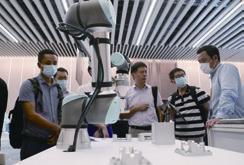
Pre-Expo Matchmaking
Visitors talk to an exhibitor at a pre-expo supply-demand matchmaking meeting for the Third China International Import Expo in Shanghai on August 8. The meeting was held at the National Exhibition and Convention Center (Shanghai), with more than 60 exhibitors and 100 purchasers attending.
Property Insurance
The China Banking and Insurance Regulatory Commission on August 5 unveiled a three-year action plan to promote high-quality development of the property insurance industry.
By 2022, China aims to forge a complete market system for the sec- tor, with enhancement of its service capabilities and fi nancial strength.
The property insurance market has been transitioning from fast growth to high-quality development, increasing the urgency to strengthen top-level design and roll out overall regulations.
Efforts will be made to improve the governance of insurance fi rms as well as boost innovation in the sector and its ability to serve national economic and social development.
China will expand the opening up of the sector, implement major fi nancial opening-up measures and accelerate the development of the reinsurance market.

